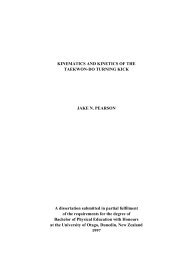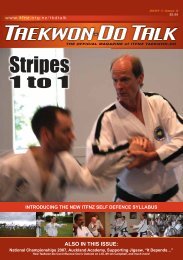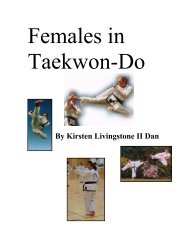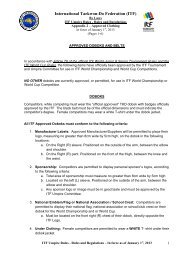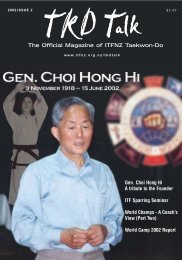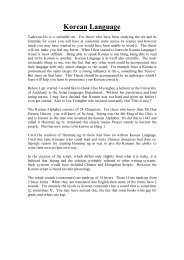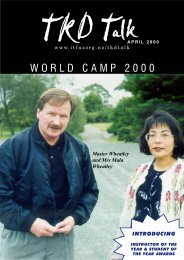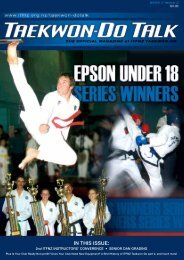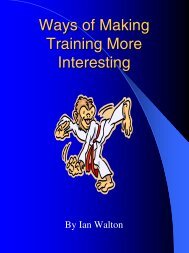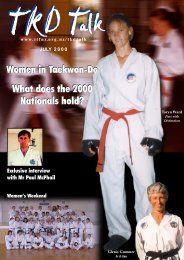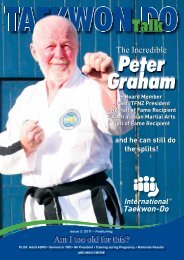Niketa Wells - International Taekwon-do Federation of New Zealand
Niketa Wells - International Taekwon-do Federation of New Zealand
Niketa Wells - International Taekwon-do Federation of New Zealand
Create successful ePaper yourself
Turn your PDF publications into a flip-book with our unique Google optimized e-Paper software.
FEATURENIKETA WELLS – UNLIKELY STAR OF THE ITF WORLD CUPBy Master Paul McPhail VII danAfter the Gold Medal was put around her neck, <strong>New</strong> <strong>Zealand</strong>Coach Mr Steve Pellow was invited to explain to the entirearena what a remarkable story had just taken place.He explained that only months earlier <strong>Niketa</strong> was wheelchair bound,unable to walk or even stand. What transpired over the months leading upto the World Cup would (and should) make a great movie. She was going tothe World Cup no matter what. And she ended up winning it!<strong>Niketa</strong> <strong>Wells</strong> is a remarkable girl.In 2011 <strong>Niketa</strong> was struck <strong>do</strong>wn withReflex Sympathetic Dystrophy (RSD),now more commonly known as ComplexRegional Pain Syndrome (CRPS). By theend <strong>of</strong> 2011 she was unable to walk,confined to a wheelchair and in constantpain. <strong>New</strong> <strong>Zealand</strong>’s leading pain specialisttold her to forget about using her feetever again.<strong>Niketa</strong> is a 1st gup at Paul M Papakura,former student <strong>of</strong> Mr Phil Dunn at Waiuku,and before that with Dan Jackson at Paul MWaiau Pa. She competed for <strong>New</strong> <strong>Zealand</strong>in Australia just prior to being struck <strong>do</strong>wnwith RSD, and had <strong>do</strong>ne well at manyRegional and National events.It was through her incredible mentaltoughness and perseverance, that shewas able to beat the condition, return totraining, and ultimately take Gold at the ITFWorld Cup in Brighton. By the time youread this, she would have tested for her 1stdegree black belt.<strong>Niketa</strong> was in a bad way by the end <strong>of</strong>2011. I recall seeing her and her Mum at ashopping centre just before Christmas andI could see the immense stress and worryin her Mum’s eyes. <strong>Niketa</strong> was in her wheelchair – still perky and happy. I vowed thento try and <strong>do</strong> more to help.We started private sessions early 2012and it was great to see she had seen someimprovement from December. She hadeven managed to attend some holidaytraining sessions on her crutches. Becausethe pain was now mainly in her lower limbs,she could actually <strong>do</strong> much <strong>of</strong> the session,including patterns by using her crutchesand also <strong>do</strong>wn on her knees. This would bequite painful at times and also must havetaken a lot <strong>of</strong> courage. This is how she alsoattended our National Camp in March thisyear (see photo in last issue <strong>of</strong> TKD Talk).Our weekend sessions were <strong>do</strong>ne at myhome with no spectators. Even <strong>Niketa</strong>’sMum or Dad were sent <strong>of</strong>f to the localcafe for an hour while we trained. This is the<strong>Niketa</strong> wanted it and worked well.From talking to her parents I was interested(and dismayed) to note that her specialistsContinued from page 1:From then on, <strong>Niketa</strong> loss theuse <strong>of</strong> her legs. Walking was nota possibility due to the pain andshe spent weeks at home, undergoingphysiotherapy fromher wheelchair. During thistime, they were told during on<strong>of</strong> the many visits to the <strong>do</strong>ctorthat the family were told to preparefor the worst, which was<strong>Niketa</strong> may never use her feetagain.“It got to the stage wherewe couldn’t <strong>do</strong> it at home anymore.<strong>Niketa</strong> was in such pain.We went back into hospital andwere then transferred into theWilson Centre, a rehabilitationunit for children,” says Pip.<strong>Niketa</strong> and Pip moved intothe Wilson Centre for sevenmonths, where <strong>Niketa</strong> undertookphysiotherapy three timesa day, something she describesas absolute agony.“I had to try and mentallyblock the pain. Even though Iwas on medication to help easeit, the pain was still there. I evensaid to my mum and the <strong>do</strong>ctor,‘Would it help if you just amputatedmy legs?’ I just wantedthe pain to go away,” explains<strong>Niketa</strong>.“But I had to keep positive.And it was when I received aletter from Grand Master Lan,a <strong>Taekwon</strong><strong>do</strong> World Championbased in Germany, saying hebelieved that I could beat thisand that I was a fighter, that Istarted to push myself.”<strong>Niketa</strong> says that while thephysiotherapy helped, it wasreally her instructor, MasterPaul McPhail <strong>of</strong> Papakura, whoreally helped her begin walkingagain.While she was still in herwheelchair, <strong>Niketa</strong> still participatedat <strong>Taekwon</strong><strong>do</strong> training,with her goal always set in theback <strong>of</strong> her mind - to competein the Brighton World Cup inEngland in October and MasterMcPhail was there supportingher through the whole process.By Christmas last year, <strong>Niketa</strong>had progressed onto crutchesand had began preparing hertraining schedule for her blackbelt.But as <strong>Niketa</strong> progressed andbegan controlling the pain,Pip started researching theoutcomes <strong>of</strong> people who havesuffered from RSD and wasshocked to find that successcases were very limited.“<strong>Niketa</strong> had just come so far,and the more she progressed,the more we found out howlimited success stories <strong>of</strong> RSDwere.“In most cases, the RSD hadbecome irreversible, and thepatients had to live with it forthe rest <strong>of</strong> their lives. Now thatwas hard at the time, thinking<strong>of</strong> that possibility.”Pip explained that the raresyndrome just <strong>do</strong>esn’t affectthe children, but the parents aswell.“The financial burden that ison these parents with childrenaffected by RSD was huge, I hadto give up my job and care for<strong>Niketa</strong> full time. Not only that,the children just can’t see thebig picture. They want a quickfix, like <strong>Niketa</strong>, wanting her legsamputated just to remove thepain then and there, but notthinking about how that actionis going to affect her later in life.It was really, really hard.”For <strong>Niketa</strong>, the hardest thingfor her was going from being anout<strong>do</strong>or person, who loved tobe active, to teaching herself towalk again.“But through the supportfrom my instructor, my familyand the RSD specialists, I learntnot to underestimate the truediscipline <strong>of</strong> thinking.”While it has taken <strong>Niketa</strong>well over a year to learn to walkagain, she still says she hasn’tfully recovered yet and theremay be a chance that the RSDmay come back.“I still get a bit <strong>of</strong> pain in myright leg and the <strong>do</strong>ctors saythey <strong>do</strong>n’t actually know whatcauses RSD and it might comeback during any stage <strong>of</strong> mylife. It is hard to know that butwe are working through it,” says<strong>Niketa</strong>.Pip and <strong>Niketa</strong> would like tothank the community for theirhad not explored aspects <strong>of</strong> nutrition. S<strong>of</strong>rom early on I had <strong>Niketa</strong> start takingsupplements including coconut, fish oiland vitamin D.The training sessions were very casual, and<strong>Niketa</strong> would chat away about her weekor what was happening in her life. Althoughcasual, there we many times in the hourwhere she would be in great pain and haveto push hard to achieve the goals I set her.In the first few sessions in particular shewould be crying, and she showed incrediblecourage.I recall on the first session with <strong>Niketa</strong> shewas still on two crutches - but at least out<strong>of</strong> her wheelchair.We began by trying to stand in a parallelready stance. My plan was to <strong>do</strong> somebasic punching, however I quickly realised<strong>Niketa</strong> could not stand on her own, letalone perform movements.Nikita beats the odds - with supportsupport from the time <strong>Niketa</strong>was diagnosed up until now.“It was absolutely amazing.The support enabled us to helpcontinue on with <strong>Niketa</strong> andget us to where we are today.And huge thanks to MasterMcPhail and for the only twospecialists who work with RSDaffected children in the whole<strong>of</strong> <strong>New</strong> <strong>Zealand</strong>, we are just reallygrateful,” says Pip.And for <strong>Niketa</strong>, she hopesthat her story will inspire othersto not give up, to keep pushingtheir way through the painand to keep thinking positively.“It was very hard, but I nevergive up. And I believe if I canlearn to walk again, then otherchildren have a fair chance atmaking through RSD too.”Above: While she was contained in her wheelchair, <strong>Niketa</strong> <strong>Wells</strong> stillparticipated at <strong>Taekwon</strong><strong>do</strong> training, with her goal always set in theback <strong>of</strong> her mind - to compete in the Brighton World Cup.26TAEKWON-DO TALK MAGAZINE



